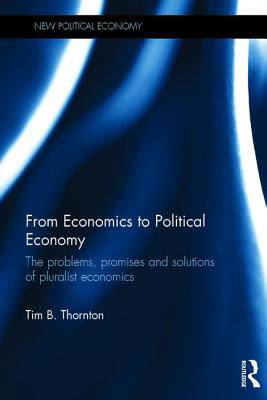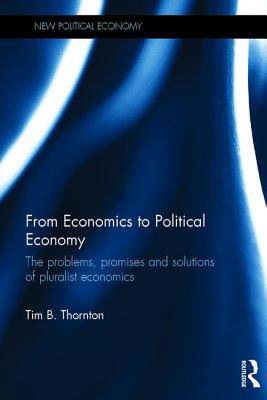
- Afhalen na 1 uur in een winkel met voorraad
- Gratis thuislevering in België vanaf € 30
- Ruim aanbod met 7 miljoen producten
- Afhalen na 1 uur in een winkel met voorraad
- Gratis thuislevering in België vanaf € 30
- Ruim aanbod met 7 miljoen producten
From Economics to Political Economy
The Problems, Promises and Solutions of Pluralist Economics
Tim B ThorntonOmschrijving
The discipline of economics has been increasingly criticized for its inability to illuminate the workings of the real world and to provide reliable policy guidance for the major economic and social challenges of our time.
A central problem in contemporary economics, and a problem from which many of its other failings flow, is its lack of plurality. By a lack of plurality it is meant that contemporary economics lacks diversity in its methods, theories, epistemology and methodology. It is also meant that economics has become far less interdisciplinary. From Economics to Political Economy offers an explanation as to why economics has become so determinedly non-pluralistic, and also gives considerable attention to exploring and evaluating promising strategies for reform. These strategies include developing a pluralist economics under the label of 'political economy' within other social science departments (such as departments of politics). Along the way the reader will learn about the worldwide student movement seeking greater pluralism in economics, encounter some dramatic case studies in intellectual suppression, gain a fuller sense of the nature of contemporary economics and explore the relationship between economics and other social sciences.
This book is of interest to any social scientist, particularly those with interests in economics and politics.
Specificaties
Betrokkenen
- Auteur(s):
- Uitgeverij:
Inhoud
- Aantal bladzijden:
- 240
- Taal:
- Engels
- Reeks:
Eigenschappen
- Productcode (EAN):
- 9781138933101
- Verschijningsdatum:
- 26/07/2016
- Uitvoering:
- Hardcover
- Formaat:
- Genaaid
- Afmetingen:
- 163 mm x 234 mm
- Gewicht:
- 453 g

Alleen bij Standaard Boekhandel
Beoordelingen
We publiceren alleen reviews die voldoen aan de voorwaarden voor reviews. Bekijk onze voorwaarden voor reviews.











